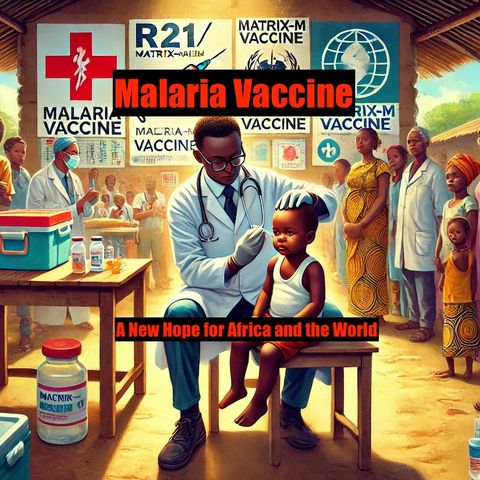Breakthrough in Malaria Control: First Vaccines Offer Hope for Millions

Download and listen anywhere
Download your favorite episodes and enjoy them, wherever you are! Sign up or log in now to access offline listening.
Breakthrough in Malaria Control: First Vaccines Offer Hope for Millions
This is an automatically generated transcript. Please note that complete accuracy is not guaranteed.
Description
In a significant stride in the global fight against malaria, recent developments have seen the introduction and deployment of the first malaria vaccines. This breakthrough offers hope of drastically reducing...
show moreMalaria, caused by Plasmodium parasites transmitted through the bites of infected female Anopheles mosquitoes, has been one of the world's most intransigent health challenges. In 2021 alone, the World Health Organization reported an estimated 247 million cases of malaria worldwide, leading to over 619,000 deaths, predominantly among children under the age of five in Africa.
The breakthrough in vaccine development involves RTS,S/AS01 (trade name Mosquirix), developed by GlaxoSmithKline. The vaccine works by targeting the circumsporozoite protein of the Plasmodium falciparum, the most deadly malaria parasite globally and the most prevalent in Africa. Clinical trials have shown that RTS,S can significantly reduce malaria cases; according to the WHO, the vaccine prevents approximately 4 in 10 malaria cases, including three in 10 cases of severe, life-threatening malaria.
In October 2021, the World Health Organization made a historic announcement recommending widespread use of the RTS,S malaria vaccine among children in sub-Saharan Africa and other regions with moderate to high Plasmodium falciparum malaria transmission. This endorsement came after a pilot immunization program in Ghana, Kenya, and Malawi, which began in 2019. This program revealed not only the vaccine's efficacy but also highlighted practical insights into deploying it within existing healthcare infrastructures.
This vaccine's rollout is seen as complementary to existing malaria prevention strategies such as bed nets and insecticides. It is not a standalone solution but rather a critical new tool in the malaria control arsenal that could significantly shift the disease burden. Moreover, other vaccines are also in development, promising even higher efficacies and broader protection against different strains and species.
However, several challenges remain in the fight against malaria. Parasite resistance to treatment, mosquito resistance to insecticides, and logistical challenges in vaccine distribution, especially in remote areas, are significant hurdles. There is also the looming threat of reduced funding and attention as the world deals with multiple health crises, including the ongoing COVID-19 pandemic.
Efforts to control malaria have also had to adapt to the realities of climate change, which has expanded the habitats of malaria-carrying mosquitoes. Innovations in surveillance and data analysis have thus become increasingly crucial in predicting and responding to outbreaks more effectively.
Overall, while the development of malaria vaccines marks a leap forward in disease control, a coordinated international effort combining vaccination, traditional preventive measures, robust funding, and public health planning is essential to achieve the ultimate goal of malaria eradication.
Information
| Author | QP-4 |
| Organization | William Corbin |
| Website | - |
| Tags |
Copyright 2024 - Spreaker Inc. an iHeartMedia Company
